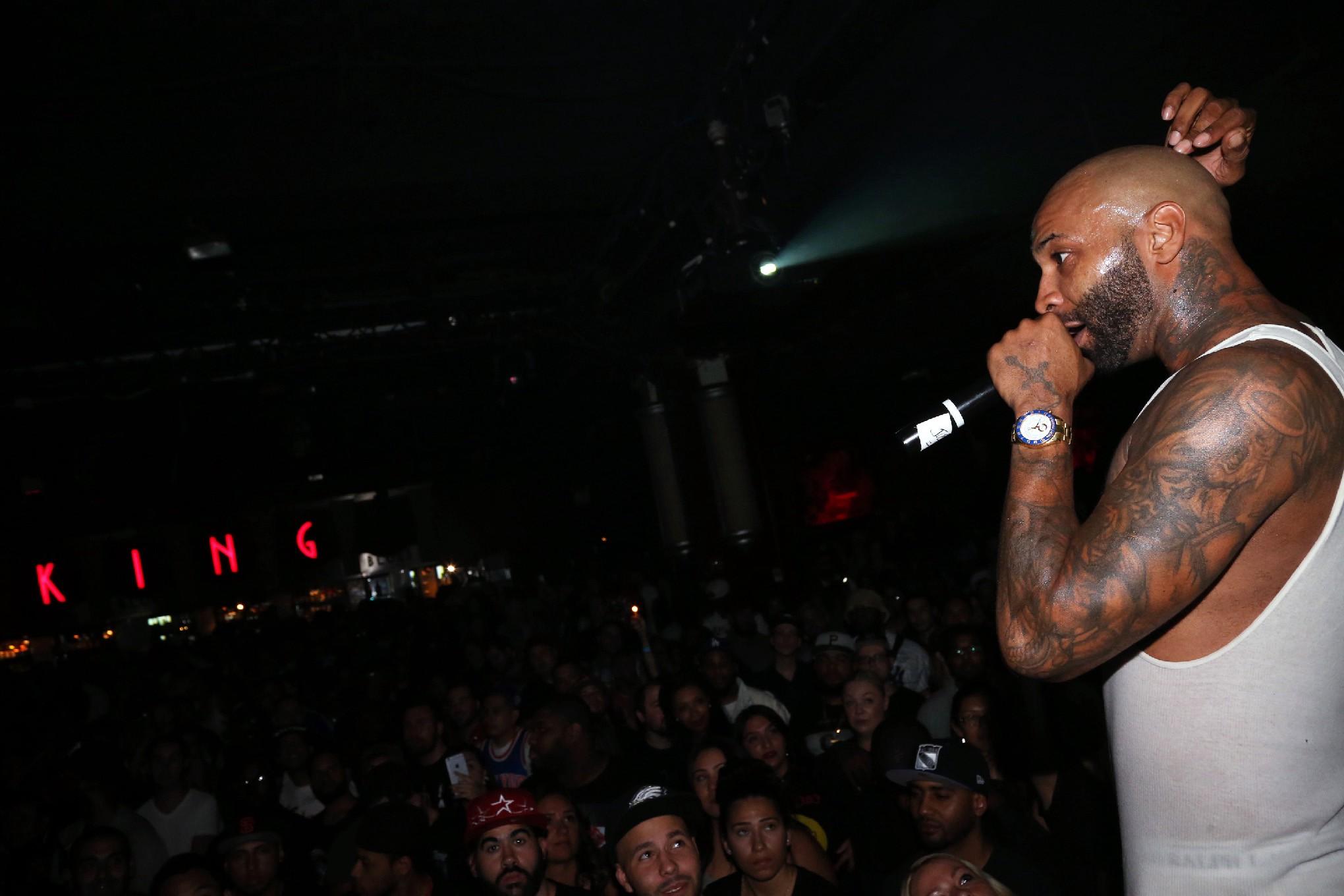
By Thomas Golianopoulos
There is no such thing as a casual Joe Budden fan. Whoever stuck around following “Pump It Up” — Budden’s massive debut single and one of the best rap songs of 2003 — witnessed his entire dazzling mess of a career: the Mood Muzik mixtape series, the beefs with A-list, B-list and C-list rappers (everyone from Jay Z to Game to Saigon), the run with underground supergroup Slaughterhouse, the label drama, the relationship drama, the drug relapse, the reality show, and everything else that helped transform him from a one-hit wonder into a beloved cult icon.
According to Budden, that journey ended this week, following a brief six-city tour he dubbed “the last Budden shows ever.” And on Monday night, two hours before his final concert in New York City, the 35-year-old rapper held a meet-and-greet with 60 diehards at the B.B. King Blues Club & Grill in Times Square to say goodbye. For about 40 minutes, Budden posed for pictures and signed autographs. He gave pounds to the men, long hugs to the women, and appraised one fan’s Budden-inspired tattoo, lyrics from the song “Downfall” snaking down a hulking forearm.
It was not a somber atmosphere. No one freaked out, no one cried. There was little hero worship — unlike the Beyhive, there is no picture-perfect Queen Bey to revere and protect. Budden has a knack for knocking himself down a peg. (He once rapped “I’m not a role model, I’m a piece of shit.”) Not only does he accept his flaws, he pushes them to the foreground. He is a chronic oversharer, a precursor of sorts to the kind of navel-gazing and vulnerability perfected on record by Kanye West and Drake. But he is more accessible than those two megastars. There is little disconnect between Budden and his followers — sometimes they meet for kickball games in Jersey. It’s a message he still pushes: his fans are his equals.
“I told a lot of those fans, ‘Don’t thank me. This is me here to thank y’all for listening,’” he tells me a few minutes after the meet-and-greet. “It’s not a one-way [relationship]. We’ve helped each other through this entire process. They’ve been fucked up. I’ve been fucked up. We’ve been fucked up together; that’s why we here.”
Budden sits in his dressing room surrounded by his manager, a videographer and two friends. Chips and salsa are the only amenities in sight. He wears black sweats. His famous beard is, as always, nWo Hollywood Hulk Hogan full. The first question is the obvious question: why call it quits now?
“We didn’t plan it this way — like much of my career, we solely went on mood,” Budden says in his trademark nasally tone. “It was the right time to close one chapter and open a new one. It’s premature to discuss the new one, but I have a good idea of where I’m heading.”
Rappers don’t get to choose when they retire — the public decides for them. But announcing an early exit became a status symbol amongst artists during the late ’90s, even if they had no intention of following through. Jay Z, as might be expected, set the gold standard for false retirements. The 2003 rollout for The Black Album included a documentary (Fade to Black), a farewell concert at Madison Square Garden, an ultimately scrapped autobiography (The Black Book), and a signature black sneaker from his Reebok S. Carter Collection.
But The Black Album was more than a synergistic marketing ploy; Jay Z was licking his wounds following the commercial and critical disappointment of The Blueprint 2: The Gift and The Curse. Eminem dwarfed him in record sales. 50 Cent had eclipsed him as hip-hop’s voice of the streets. The sting of “Ether” lingered. He was bitter. “I’m supposed to be number one on everybody list/We’ll see what happens when I no longer exist/Fuck this,” Jay Z rapped on “What More Can I Say?” (Has there ever been a more “I’m-taking-my-ball-and-going-home” lyric in hip-hop history?) The Black Album allowed him to change the narrative with a flawless victory lap that never descended into burlesque like the Kobe Bryant and Derek Jeter retirement tours. One last time he needed y’all to roar — and he got his wish. Of course, Jay Z didn’t actually retire. Over the next year, he released albums in collaboration with R. Kelly and Linkin Park, respectively. A solo album, Kingdom Come, followed in 2006.
Maybe Joe Budden is trying to do the same thing: a break followed by a career reset. He says he did not make the announcement to boost sales (“I wasn’t trying to fill the seats”) or harvest an outpouring of love. “I thought I owed it to the people that were attending to let them know this is it,” he says. In fact, he is not even retiring, something he is unambiguous about during our conversation. “Y’all [the media] called it that,” he says. “My words were clear and concise: This will be the last Joe Budden show in New York. That’s it.”
What chapter, then, is closing?
“Joe Budden shows. Joe Budden period.”
Is this a reincarnation angle? Are you changing your stage name?
“Nah, nah, simmer down, we’ll get to that somewhere down the line. Right now we are dealing with Joe Budden and this is we closing the curtain on Joe Budden.”
It’s rumored that Budden, along with producer araabMUZIK, is behind a burbling project called Rage and the Machine. Budden has also tweeted frequently about something he’s calling “The Mission.”
For now, he has to deal with a brewing war of words with Drake stemming from Budden’s critique of Views. “I think that that kid on that album that I heard sounds real fucking uninspired — that’s what I think,” he said on his podcast. Drake responded with a slew of subliminal disses on “4PM in Calabasas.” The most glaring jab: “All the sudden I got people showing how much they truly resent me/They whole demeanor just spells envy.” Then, in a moment true to his brand, Budden played the record on a recent podcast, chiming in whenever he thought a line was about him. “That’s me. This is me. This is me. That’s me too,” he said. “Back to me. … The end is about me.”
Backstage at B.B. King’s, Budden is reticent about Drake and “4PM.” “Great record,” he says. “Loved it.” When asked what his warning to Drake — “You’re dealing with a different level of MC. Don’t play with me” — signified, he says, “The MC’s know who the MCs are. The MCs know.”
He’s more expansive once on stage. “I want to thank you all for travelling with me on this journey. The picture has not always been pretty, but it’s been authentic,” he says toward the end of his 90-minute set. “Some of you here know a thing or two about authenticity — that is dear to me. In the coming weeks, you will hear from some people who are not the most authentic of people.” As the sold-out crowd erupts into dueling “Fuck Drake” and “Fuck Aubrey” chants, Budden tries to play peacemaker: “No, no, no, Rage is full of love,” he says.
The last Joe Budden show does not feel like goodbye. It feels like a Joe Budden show: intermittent chants of “Joey, Joey,” rabid fans rapping along to obscure mixtape cuts from 2005, guys in New Jersey Devils hats shouting lyrics like “I got bitches lined up, I got an ego too” into their girlfriend’s ears (and getting slapped, playfully, for it), and Budden stopping songs abruptly because continuing the verse, he says, might make him cry.
Budden returns to his fans throughout the night. “A lot of you are very special to me,” he says to loud cheers. “A lot of you I’ve grown familiar with over the years.” He stood silent on stage. One last time, he needed to hear the roar. “We ain’t gonna be here again,” he says, “might as well soak it up.” Until the next time, at least.

